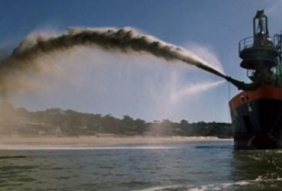
Posted on January 5, 2016
The government has directed all its 12 state-owned ports to finalize capital and maintenance dredging contracts on the basis of open competitive bidding, according to the new guidelines framed by the shipping ministry. Capital dredging is for increasing the depth of navigational channels while maintenance dredging is to maintain depths. The guidelines give details of the pre-dredging and post-dredging surveys to be carried out by these ports to avert disputes and arbitration.
The shipping ministry, which controls these 12 ports, has also advised them to opt for long-term maintenance dredging contract of as long as five years instead of the current practice of going for annual contracts. The ministry has also suggested the method to be adopted keeping in view the annual siltation pattern at these ports.
Among the major ports, the “depth based dredging contract” may be adopted at Kolkata, Cochin and Kandla where sufficient data from previous years are available and dredging is required throughout the year; the contract may be linked with incentive and disincentive mode of payment for guaranteeing the depth.
When the dredging is only seasonal, a quantity-based method of payment could be used. In exceptional circumstances, where dredging is required to be done for a very short period, a day hire method may also be adopted.
Considering the soil nature, west coast ports such as Mumbai, Jawaharlal Nehru port, Cochin, New Mangalore and Mormugao can explore the feasibility of adopting a nautical depth concept after conducting research studies. In the nautical depth concept, the ship’s keel may appear to touch the sea bottom but it navigates through this layer without causing damage to the ship’s keel. The adoption of nautical depth will reduce annual maintenance dredging.
The new guideline says the government has the right to assign, in public interest, any contract for dredging in any of the 12 ports to state-owned Dredging Corp. of India Ltd on a nomination basis (without floating a tender).
Because of frequent variation in price due to de-regulation of fuel prices, price adjustment will be allowed irrespective of contract duration and this may be incorporated in the tender documents, the ministry wrote.
Previously, no price adjustment was permitted in respect of contracts less than six months in duration.
Indian firms owning Indian flag dredgers including Dredging Corp. of India shall have the first right of refusal if their rate is within 10% of the lowest price quoted by a foreign dredging contractor in a public tender.
“This would apply to both capital and maintenance dredging tenders. If more than one firm owning Indian flag dredger participates in the tender, the right of first refusal will go to that Indian firm which has quoted the lowest rate and is within 10% of the lowest offer,” according to norms.
The request for proposal (RFP) process for award of contract should commence only after approval/sanction of the plan and statutory clearances by competent authorities.
The pre-qualification/minimum eligibility criteria will be based on the firm’s experience, considering both quantity and value of successfully executed dredging projects.
The dredger to be deployed for the project should be of absolute ownership, disponent ownership (not a registered owner but one who has control over the commercial operations of the ship by chartering the vessel), time charter (an arrangement wherein the shipowner lets or leases his vessel and crew to the charterer for a stipulated period of time) and bare boat charter (the charterer hires only the ship while taking commercial and technical responsibility for the vessel including maintenance, crew and insurance). Hiring of dredgers shall also be considered.
In case the firm does not own the dredger and plans to execute the capital/maintenance dredging works by arranging the dredger by wet leasing or hiring, it has to pay an additional security deposit of 5% in addition to the security deposit indicated in the tender, which will be returned without interest after completion of the dredging work.
Besides, details of arranging dredgers for the work with “irrevocable letter of authority” from the owner have to be submitted by the bidder stating that the dredger so charted/hired shall not be withdrawn till completion of the work.
In case of rock dredging works, the firm should have the experience of rock dredging of at least 20% of the estimated cost of the project and have necessary equipment considering the classification of rock, either by own or by hiring. In case of the latter, the dredging firm has to furnish an assurance letter, at the time of pre-qualification, from the owner on sparing the dredging equipment.
To settle disputes, ports may incorporate a new mechanism in tenders by setting up a panel under the chairmanship of the port chairman with chief engineer, financial advisor and chief accounts officer and the deputy port conservator of the port as members. The panel will examine the dispute and give its recommendation to the board of trustees. If the row is not settled amicably, it will be referred to arbitration.
India’s state-owed ports will require extensive dredging to implement the so-called Sagarmala project which seeks to develop ports on a large scale by improving existing ports and creating new ports and also development of the inland water transport sector.





